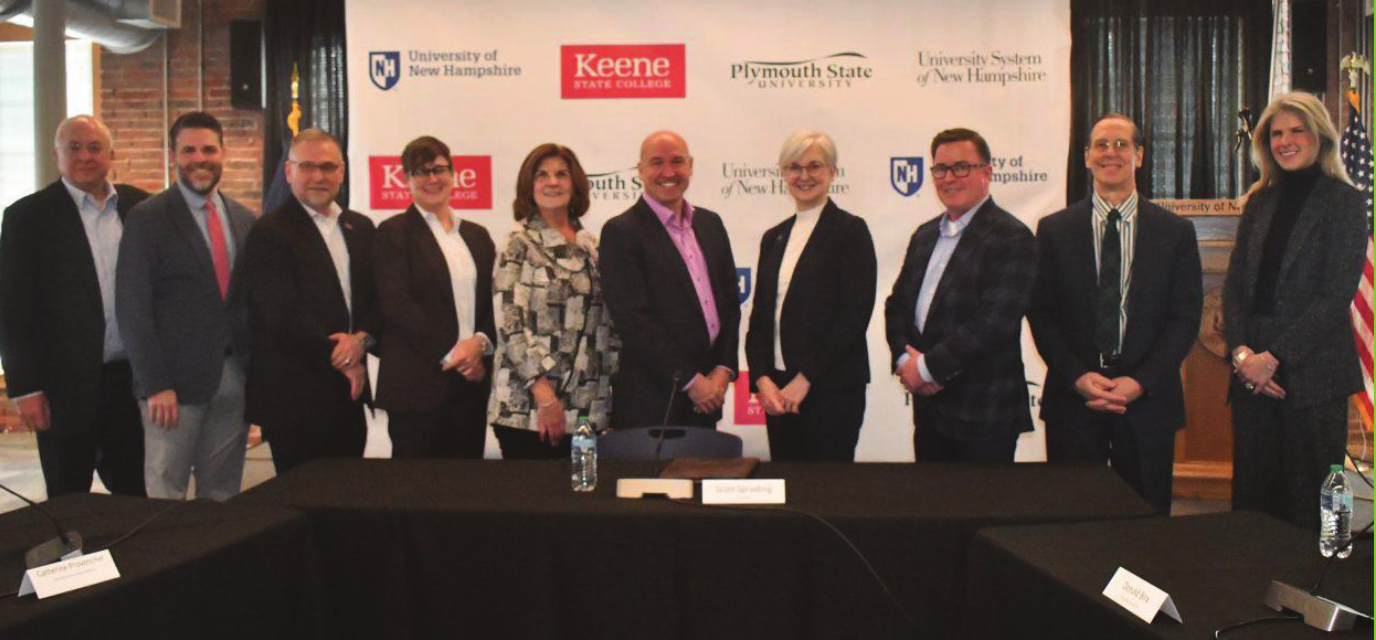
Attract, equip and retain. That may sound like the motto of a certain reality show, but it has also become bywords for the University System of New Hampshire’s efforts to bolster the Granite State’s workforce.
Leaders of the University System of New Hampshire and New Hampshire economic leaders gathered at the University of New Hampshire at Manchester on January 22 for a roundtable event to discuss ongoing collaborative efforts to provide the state’s businesses with qualified employees as well as efforts to provide those employees what they need to make or keep New Hampshire as their home.
Business and Industry Association of New Hampshire President Mike Skelton emphasized the urgent need for workforce replenishment in the state, noting a recent study that put 27% of New Hampshire’s workforce at 55 or older, making it the oldest workforce in the country. However, he also noted that, anecdotally, New Hampshire leads the nation when it comes to cooperative workforce development.
“What I hear from my colleagues across the country who are running state chambers of commerce or state business associations is that they marvel at the fact that, in New Hampshire, we have access to folks in government, the business community, higher education, and the amount of collaborative discussions and quickly bringing together stakeholders is something that just does not happen in bigger states,” said Skelton.
Two regional examples of this workforce development collaboration were presented in the form of college–business partnerships, with the first coming in Cheshire County.
According to Keene State President Melinda Treadwell, approximately 70% of the diamond-turning equipment used globally in high-end optics is produced Cheshire County, with the demand for educating workers in those companies bringing in congressionally directed funding to the college last year. One example of that education pipeline comes in the form of a partnership between Keene State College and Moore Nanotechnology Systems of Swanzey, NH. The two organizations have joined together to provide students hands-on experience in the world of ultra-precision machine tool and associated advanced optical components with the potential to eventually provide those students with a readymade career upon graduation.
Moore President and CEO Mark Boomgarden spoke favorably of Keene State’s ability to listen to his company’s workforce needs and provide opportunities for students looking to gain experience.
“Other schools that provide support are more on the technical side; it doesn’t get into the curriculum of (professional) development,” he said. “I really enjoy my relationship with (Keene State). I know most of Melinda’s staff, and if she’s not available, within an hour or a day, we’re walking and talking and getting a meal at a little Thai restaurant in town and solving all the world’s problems.”
The other collegiate–business partnership explored at the roundtable came from the White Mountains where Plymouth State University is working with Tenny Mountain Resort. Plymouth State University President Dr. Donald Birx told the panel that students have helped over 500 businesses across the state, including many small businesses in the North Country.
Tenny Mountain CEO Steve Kelly hopes to build his ski resort into a four-season destination as well as a scientific office hub, working with Plymouth State students in fields ranging from cybersecurity to life sciences.
Kelly believes that it’s important for New Hampshire businesses to see themselves as part of an economic ecosystem rather than separate companies and work with educational organizations like Plymouth State to continue fostering new talent, with Birx adding that Plymouth State’s goal is to develop cross disciplinary problem-solvers that are ready to partner with various types of businesses.
“Your team is always your most critical resource,” said Kelly. “If you understand that dynamic, you understand why you need a constant funnel of people coming into your industry.”
It is the hope of Birx and Kelly that the life sciences growth in Manchester’s Millyard can begin to extend north as Dean Kamen’s Advanced Regenerative Manufacturing Institute and other similar nearby companies continue to develop Manchester’s reputation as a biomanufacturing hub.
Roundtable moderator Scott Spradling said that those stories and other collaboration between businesses and colleges across the state to transition college graduates into specialized fields need to be shared with more businesses reaching out to New Hampshire’s colleges to create more job-based training experiences as well as career placement upon graduation in a variety of professions.
“I don’t think many people outside (the roundtable) realize all of the connections already going on,” said Spradling.
This article is being shared by partners in the Granite State News Collaborative. For more information, visit collaborativenh.org.